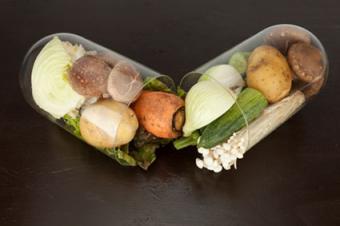
Many people consider a vegan diet healthy because it consists mostly of fruit, vegetables, whole grains, and legumes. However, if you don't eat meat or dairy, you may be at risk of developing certain nutritional deficiencies. It's easier to avoid these deficiencies if you know what they are and take steps to prevent them.
Common Vegan Nutritional Deficiencies
Since fruits and vegetables are packed with nutrients, it might seem odd that a plant-based diet could be deficient in anything. However, meat and dairy contain large amounts of key vitamins and minerals that are almost non-existent in plant foods. To stay healthy, you must find vegan alternatives to compensate for any deficits.
Calcium
Calcium, commonly found in dairy products, is necessary for your body to build strong bones and teeth. It also supports heart health, nerve function, and muscle contraction. Calcium may also help protect against cancer, high blood pressure, and diabetes
According to Dr. Andrew Weil's website, symptoms of calcium deficiency range from mild to severe and may include:
- Brittle bones (osteoporosis)
- Numb or tingling fingers
- Lethargy
- Muscle cramps
- Confusion
- Delayed development
- Skeletal malformation
Many non-vegans struggle to get the recommended daily allowance (RDA) of 1,000 to 1,200 mg of calcium, so it's not surprising vegans may become calcium deficient. To get more calcium, eat these foods:
- Collard greens
- Mustard greens
- Turnip greens
- Kale
- Bok choy
- Calcium-fortified tofu
- Calcium-fortified soy milk
- Broccoli
- Calcium-fortified orange juice
Vitamin D
Vitamin D and calcium go hand-in-hand since vitamin D is necessary for calcium absorption. It's also critical for muscle movement, healthy nerves, and a strong immune system. One of the best sources of vitamin D is sunlight; however, many people avoid the sun or block it with sunscreen to reduce their risk of skin cancer. This may leave vegans and non-vegans deficient. Vitamin D deficiency may cause many symptoms, and it may be linked to joint pain.
Vitamin D is not found naturally in many foods. Vegans may struggle to consume the RDA of 600 IUs for adults 19-70 years old in diet alone. Try adding more vitamin D fortified juices, soy milk, almond milk, hemp milk, and cereals to your diet. According to the National Institutes of Health (NIH), mushrooms contain some vitamin D, and some varieties are being exposed to ultraviolet light to boost vitamin D content.
If you are not exposed to sunlight regularly, consider taking a daily vegan vitamin D supplement.
Vitamin B-12
Vitamin B-12 is only produced naturally in animal products. No plant foods naturally contain vitamin B-12. Deficiency of this nutrient may lead to several health issues.
Vegans can get vitamin B-12 from fortified foods including milks, soy products, and cereals. This nutrient is also available in nutritional yeast. However, it may not be enough to meet the adult RDA of 2.4 mcg. Consider taking a vitamin B-12 supplement.
Omega-3 Fatty Acids
There are three types of omega-3 fatty acids (omega 3-s): alpha-linolenic acid (ALA), eicosapentaenoic acid (EPA), and docosahexaenoic acid (DHA). According to NIH, the primary ALA sources in the U.S. diet are vegetable oils. EPA and DHA are mainly found in fatty fish, such as salmon and tuna.
Products containing omega- 3s are marketed for promoting heart health. According to NIH, consuming omega-3s from seafood may reduce your risk of heart disease and relieve rheumatoid arthritis symptoms. Omega-3s have numerous other health benefits, as well, so it's important to get the RDA of up to 1,000 mg.
Vegan sources of omega-3s include:
- Canola oil
- Flaxseeds or flaxseed oil
- Hemp seeds or hemp oil
- Algae oil
- Chia seeds
- Navy beans
- Kidney beans
- Soybeans
- Walnuts
- Pecans
- Cauliflower
- Broccoli
Keep in mind that not all vegan foods contain all three types of omega-3s, so it's good to eat a wide variety. You can try supplements, but it's unclear if they offer the same benefits as omega-3s obtained from whole foods.
Iron
Iron is a mineral and important compound in hemoglobin, which carries oxygen from the lungs to body tissues. There are two types of iron: heme and non-heme. Heme iron absorbs better than non-heme.
Since meat, seafood, and poultry are the main sources of heme iron, it makes sense vegans may be deficient, yet that is not necessarily the case. A study published in the American Journal of Clinical Nutrition found no difference in iron levels between vegetarians and non-vegetarians. This may be due to the high number of iron-rich plant foods vegetarians consume, and other plant foods that support iron absorption.
The iron RDA for adults ages 18-50 is 8mg for men and 18mg for women. Anyone with low iron, including vegans, is at risk of developing iron deficiency anemia, which has numerous symptoms.
Good vegan sources of iron include:
- Fortified cereals
- Nuts
- Seeds
- Beans
- Lentils
- Collard greens
- Swiss chard
- Tomatoes
- Blackstrap molasses
For vegans, it's not as important how much iron you eat as how you eat it to increase absorption. McKinley Health Center offers these guidelines:
- Eat non-heme iron foods with foods that contain vitamin C
- Avoid iron-blocking tannins found in coffee, tea, walnuts, berries, and apples when eating iron
- Cook meals in a cast-iron skillet; the iron in the skillet leaches into your food
- Do not take a calcium supplement at the same time you eat iron
Zinc
Zinc is important for cell metabolism and immunity. According to NIH, the body does not store zinc, so it's important to get the RDA of 11mg for men and 8mg for women nineteen years and older. Non-vegans get most of their zinc from oysters, shellfish, meat, and poultry.
Zinc deficiency can be difficult to diagnose. Symptoms may be vague or blamed on another condition.
NIH indicates you're at risk of zinc deficiency if you don't eat meat yet eat a lot of legumes and whole grains. Legumes and unleavened whole grains contain phytates, which prevent zinc absorption. Soaking beans, grains, and seeds until sprouts form before eating may help increase the amount of zinc absorbed.
Other vegan sources of zinc are:
- Leavened grains
- Tofu
- Tempeh
- Almonds
- Oatmeal
- Chia seeds
- Cashews
- Walnuts
- Pecans
- Peanuts
Get the Nutrients You Need
It doesn't matter if your reason for being vegan is overall health, animal welfare, or both. It's like any eating plan in that you have to find balance. To avoid nutritional deficiencies, you must work a little harder to incorporate certain nutrients into your diet. Inspect your diet to determine if you may be deficient in any nutrients and figure out where you can improve. If you need help determining what to eat and how much, consider talking to a nutritionist. Never self-diagnose vitamin deficiencies since symptoms often mimic other conditions. If you think you have a deficiency, consult your doctor.







